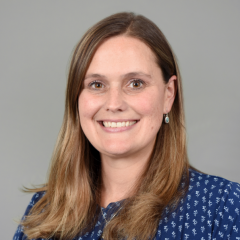Actor Bruce Willis, known for his wise-cracking, action hero roles in movies like “Die Hard,” will be retiring from acting because he has been diagnosed with aphasia, a communication disorder that impairs the ability to speak and understand language.
Willis, whose family members revealed his condition on social media on Wednesday, is one of more than 2 million Americans who deal with the disorder, according to the National Aphasia Association.
READ ALSO: Ranking Arizona: Top 10 hospitals for 2021
There are many types of aphasia, and their causes and symptoms vary, according to Corianne Rogalsky, an associate professor in the College of Health Solutions at Arizona State University as well as the director of the Communication Neuroimaging and Neuroscience Laboratory at ASU. Her lab is a member of the Multisite Aphasia Research Consortium, funded by the National Institutes of Health.
Rogalsky answered some questions from ASU News about the condition:
Question: What is aphasia?
Answer: Aphasia is any sort of language impairment due to a change in the brain. Language can be speaking, understanding what is being said to you, and also reading and writing abilities.
Aphasia has different causes, and there are different kinds.
Aphasia can be caused by an event that happens to the brain, such as a stroke or a traumatic brain injury, like a car accident. It can also be caused by progressive changes to the brain, such as a tumor or some types of degenerative diseases that cause dementia.
There are many different types, ranging from very mild impairment to very severe impairment, which affects all types of communication. And within that severity range, different types of language can be impaired. For some individuals, their biggest difficulty is speaking, but they can understand very well. Others can’t understand what is spoken, but their speaking comes out fluently.
Q: Is it a matter of knowing a word and not being able to speak it, or is it not being able to find the word?
A: One fairly universal symptom of aphasia, regardless of type or cause or severity, is word-finding impairment. If the individual thinks of their pet dog, they can picture the dog and have vivid memories of the dog, but they are unable to come up with or produce the name of their dog.
Q: Is it progressive?
A: Individuals that have aphasia due to events like stroke or brain injury often do get better over time because of biological recovery and the healing of the brain, and also the wonderful work of speech-language pathologists working with individuals on rehabilitation.
But if the cause is degenerative, like brain disease or tumor, then typically symptoms get worse over time, and they can’t be rehabilitated, but the therapy would focus on helping the individual and caregivers compensate for the deficiencies.
Q: Does it typically happen to adults?
A: Children can have brain injury or a change to the brain, but a child’s brain is much more plastic and amenable to change. It’s typically thought of as occurring in adults.
Q: What are the treatments for aphasia?
A: Treatments vary depending on cause and severity. But all aphasia treatments will be personalized to focus on maximizing the communication of that particular individual and what they value the most. For example, that might be working to ensure effective communication with their caregiver or their ability to continue writing short stories.
The focus is on improving the quality of life.
Aphasia therapy typically involves working intensively and frequently with a speech-language pathologist to learn new ways for their brain to speak or understand speech. This can involve a lot of intensive work, repeating words or practicing simple phrases or understanding something over and over again. There’s a lot of repetition. We know that the more frequent and intense the therapy, the better the outcome.
Q: Are there any medications?
A: There are pharmaceutical interventions on the horizon that are being explored in the research realm, but currently the medications are often used to treat the underlying cause, so there are ways to reduce the impact of a stroke and brain damage caused by stroke and drugs to slow tumor growth.
There are also some relatively new and exploratory drugs to slow the progress of dementia.
Q: What else is important to know about aphasia?
A: The main thing to know is that for individuals with aphasia, typically their cognitive and emotional and social abilities are intact, even if they can’t express everything they are thinking. They are the same person even if they can’t express themselves the same way through language.
The other important thing is that the ability to communicate is the No. 1 predictor of quality of life after some sort of brain change. Multiple studies show that. Aphasia can be particularly devastating to an individual, so the work that speech-language pathologists do to improve communication isn’t just important for speaking and understanding, it’s important for the whole person.
Help at ASU
People with aphasia can find help at ASU, where the Speech and Hearing Clinic offers both individual therapy and group programs. The services are low cost, and scholarships are available.
“We have four aphasia groups that we run every semester — fall, spring and summer,” said Joshua Breger, a clinical assistant professor in the College of Health Solutions and director of the clinic.
The groups are divided by severity of symptoms.
“Some with mild aphasia may need just a little bit of help, and some groups have individuals with much greater difficulty, and most of them have a hard time expressing themselves. They may only be able to say one word at a time or get their words mixed up and not come out correctly,” he said.
“Sometimes they have a perception deficit where they are unable to comprehend what’s coming in from an auditory standpoint or a written standpoint.”
Graduate students in the master’s of communications disorders program develop lesson plans for the sessions, supervised by Breger or Elizabeth Trueba, a clinical assistant professor.
“They try to develop general life skills and help the individual to be able to advocate for themselves and participate as much as they can,” Breger said.
That might include practicing calling the pharmacy or ordering a meal at a restaurant.
Trueba runs a book club for people with aphasia, which is funded by donations and has been a great source of support for the participants. The groups build camaraderie not only among the participants, but also their caregivers, who have time to chat and exchange information, she said.
Trueba described one client of the clinic: “We had a gentleman whose daughter was getting married, so we spent several sessions working on the speech he would make at his daughter’s wedding.
“It was such an impactful and cool way to help someone. He felt confident that he could give that speech even though he had aphasia.”





